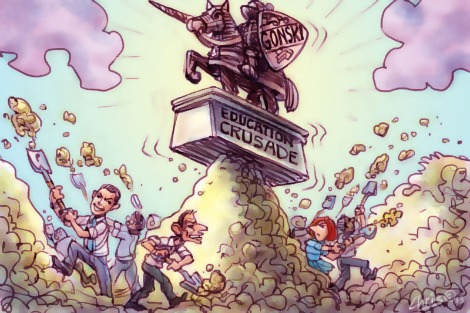 Federal Education Minister Christopher Pyne is correct in saying that the Gonski scheme is a mess, but culpably wrong to use that fact to ditch the whole idea. The Gonski mess shows few of the actors concerned in a good light, and some, including Pyne himself, in a very poor one. It also reveals fundamental problems in the governance as well as the funding of Australian schooling.
Federal Education Minister Christopher Pyne is correct in saying that the Gonski scheme is a mess, but culpably wrong to use that fact to ditch the whole idea. The Gonski mess shows few of the actors concerned in a good light, and some, including Pyne himself, in a very poor one. It also reveals fundamental problems in the governance as well as the funding of Australian schooling.
Heading the list of those responsible for the mess is the person who also deserves most credit for coming up with the Gonski review in the first place, and for driving it to the brink of success: former education minister and prime minister Julia Gillard.
Gillard must surely regret her loss of faith midway through the process. Even though the review was her creation, and even though it came up with well-argued and widely-supported proposals, Gillard gave the report a lukewarm, even chilly reception. We'll have to see if the money is there, she said, before launching Gonski on the treacherous waters of 'further consultation', the extensive consultations already undertaken by the review notwithstanding.
Another six months on, Gillard changed tack again, declaring a national education 'crusade' with Gonski as its centrepiece, but by then it was too late. Gillard's mid-stream hesitation was fatal. The 'consultations' effectively eviscerated Gonski.
The first of several key components to go was a 'national school funding body'. As Gonski panel member Ken Boston pointed out recently, that concession to the states and non-government sectors meant that no agency or government was in a position to do the complicated arithmetic required by Gonski's 'needs-based sector-blind' funding model. Hence the technical mess that gives Pyne a spurious causus belli.
Pyne's contribution to this debacle was to act as spoiler from the day the Gonski report was released. In that role he has so far adopted no less than four positions: any Labor legislation of Gonski would be repealed by a Coalition government in favour of the existing funding system; an Abbott government would go with Gonski only if all states and territories signed up; the Coalition was on a 'unity ticket' with Labor and would implement Gonski even though some states and territories had not signed up; and now, after only ten weeks in government, Gonski is ditched.
This deviousness owes much to the then-Opposition's strategy of denying legitimacy to the Gillard Government. It arises also from a bedrock belief in subsidising 'choice' rather than reducing the need for it. And there's the money problem. Although the position is not yet clear, it seems likely that the Abbott Government is proposing to spend less than both it and Labor promised before the election.

Pyne's fourth and current position on Gonski may not be his last. He has bought a serious fight with powerful adversaries. The New South Wales Government, a strong supporter of Gonski from the outset, is livid. Other states, both those who signed up for Gonski and those that didn't (WA, Queensland and NT) will want the money even if they don't want Gonski's needs-based way of distributing it. The Catholic system has been circumspect so far, but it will no doubt mobilise if need be. Tony Abbott's assurances of yesterday, following Pyne's provocations of the day before, suggest that the Prime Minister is more aware of the danger than is his minister
Behind the political and administrative debacle lie fundamental problems of the structure and governance. First is Australia's unique sector system, which sees three different sectors in receipt of government funding in three different mixes, and two of them charging fees while the third does not. It is an inherently divisive and unstable arrangement, and the source of political grief extending back well into the 19th century.
Second, these complications are compounded by the involvement of both federal and state/territory governments in all three sectors. The system is inherently wasteful and ineffectual as well as unstable and divisive.
Third, the drawn-out saga of Gonski has made clear that the machinery of federal-state cooperation through COAG set up by Labor to handle the first and second problems has failed. A different division of funding labour between governments now seems inevitable. One of several options would be to give the states the money for government schools while Canberra takes the non-government sectors.
Last, arguments used to justify school funding since the 1950s are in serious, perhaps terminal trouble. Treasury warnings last year that government spending was rising faster than government income are now echoed across the ideological spectrum. Whatever the upshot of the current political tussle we are headed for hard budgetary times. How will schooling justify its demand for more?
For more than 50 years the claim has been that more funding would allow smaller classes and a more professional teaching profession, and that would in turn bring better and more equal schooling. It has not worked out that way. Per student per year real-terms funding has multiplied at least two and a half times since the mid 1960s. The salaries and status of teachers are no better than they were half a century ago.
While much has improved in schooling there is no evidence to suggest better outcomes or more equality in key areas of learning, and certainly none commensurate with either funding increases or class size reductions.
Gonski encouraged attention to where and how the money is spent, but also maintained a long tradition by insisting that money would be better used only if there was more of it. The question now on the agenda for all concerned, including Gonski's legion of supporters, is whether more can in fact be done with the same, or less.
 Dean Ashenden was Ministerial Consultant (1983–86) to federal education minister Susan Ryan, and has been a consultant to many state and national education agencies.
Dean Ashenden was Ministerial Consultant (1983–86) to federal education minister Susan Ryan, and has been a consultant to many state and national education agencies.
Original artwork by Chris Johnston